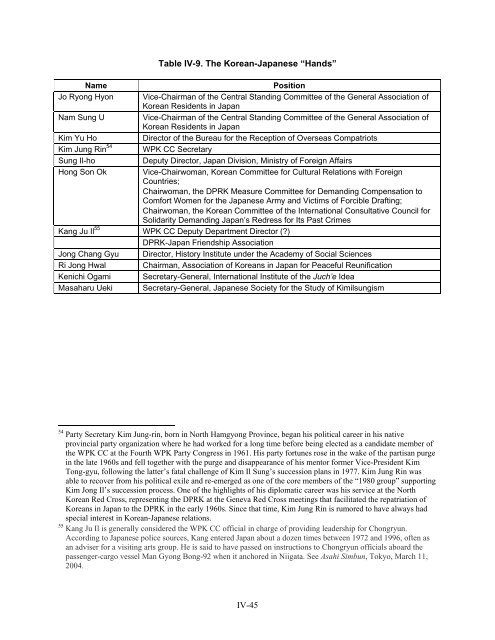North Korean Policy Elites - Defense Technical Information Center
North Korean Policy Elites - Defense Technical Information Center
North Korean Policy Elites - Defense Technical Information Center
Create successful ePaper yourself
Turn your PDF publications into a flip-book with our unique Google optimized e-Paper software.
Name<br />
Jo Ryong Hyon<br />
Nam Sung U<br />
Table IV-9. The <strong>Korean</strong>-Japanese “Hands”<br />
Position<br />
Vice-Chairman of the Central Standing Committee of the General Association of<br />
<strong>Korean</strong> Residents in Japan<br />
Vice-Chairman of the Central Standing Committee of the General Association of<br />
<strong>Korean</strong> Residents in Japan<br />
Director of the Bureau for the Reception of Overseas Compatriots<br />
WPK CC Secretary<br />
Deputy Director, Japan Division, Ministry of Foreign Affairs<br />
Kim Yu Ho<br />
Kim Jung Rin 54<br />
Sung Il-ho<br />
Hong Son Ok Vice-Chairwoman, <strong>Korean</strong> Committee for Cultural Relations with Foreign<br />
Countries;<br />
Chairwoman, the DPRK Measure Committee for Demanding Compensation to<br />
Comfort Women for the Japanese Army and Victims of Forcible Drafting;<br />
Chairwoman, the <strong>Korean</strong> Committee of the International Consultative Council for<br />
Solidarity Demanding Japan’s Redress for Its Past Crimes<br />
Kang Ju Il 55 WPK CC Deputy Department Director (?)<br />
DPRK-Japan Friendship Association<br />
Jong Chang Gyu<br />
Ri Jong Hwal<br />
Kenichi Ogami<br />
Masaharu Ueki<br />
Director, History Institute under the Academy of Social Sciences<br />
Chairman, Association of <strong>Korean</strong>s in Japan for Peaceful Reunification<br />
Secretary-General, International Institute of the Juch’e Idea<br />
Secretary-General, Japanese Society for the Study of Kimilsungism<br />
54 Party Secretary Kim Jung-rin, born in <strong>North</strong> Hamgyong Province, began his political career in his native<br />
provincial party organization where he had worked for a long time before being elected as a candidate member of<br />
the WPK CC at the Fourth WPK Party Congress in 1961. His party fortunes rose in the wake of the partisan purge<br />
in the late 1960s and fell together with the purge and disappearance of his mentor former Vice-President Kim<br />
Tong-gyu, following the latter’s fatal challenge of Kim Il Sung’s succession plans in 1977. Kim Jung Rin was<br />
able to recover from his political exile and re-emerged as one of the core members of the “1980 group” supporting<br />
Kim Jong Il’s succession process. One of the highlights of his diplomatic career was his service at the <strong>North</strong><br />
<strong>Korean</strong> Red Cross, representing the DPRK at the Geneva Red Cross meetings that facilitated the repatriation of<br />
<strong>Korean</strong>s in Japan to the DPRK in the early 1960s. Since that time, Kim Jung Rin is rumored to have always had<br />
special interest in <strong>Korean</strong>-Japanese relations.<br />
55 Kang Ju Il is generally considered the WPK CC official in charge of providing leadership for Chongryun.<br />
According to Japanese police sources, Kang entered Japan about a dozen times between 1972 and 1996, often as<br />
an adviser for a visiting arts group. He is said to have passed on instructions to Chongryun officials aboard the<br />
passenger-cargo vessel Man Gyong Bong-92 when it anchored in Niigata. See Asahi Simbun, Tokyo, March 11,<br />
2004.<br />
IV-45













